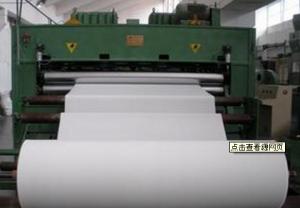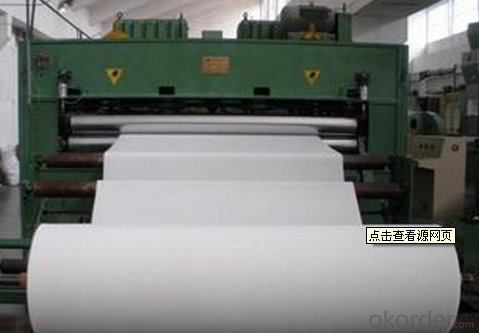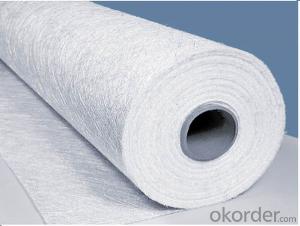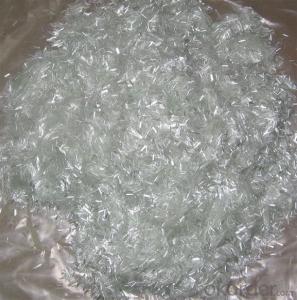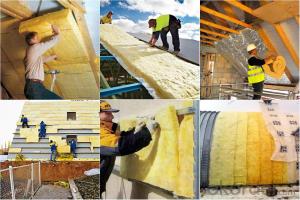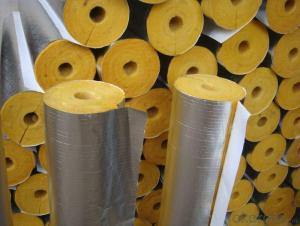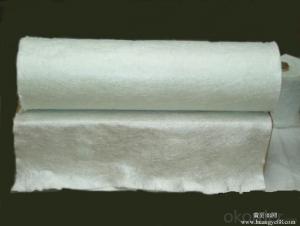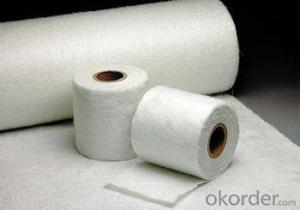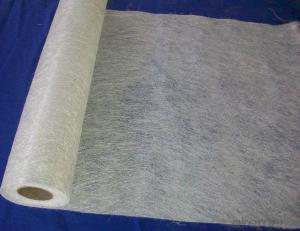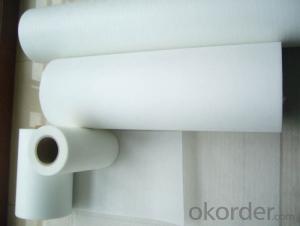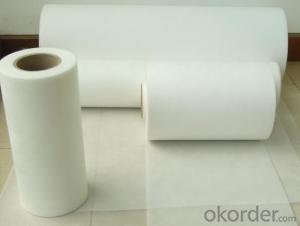Fiberglass Mat Tissue E Glass Fiber Stitched Mat for FRP Industry
- Loading Port:
- Shanghai
- Payment Terms:
- TT or LC
- Min Order Qty:
- 10000 kg
- Supply Capability:
- 200000 kg/month
OKorder Service Pledge
OKorder Financial Service
You Might Also Like
Brief Introduction
The stitched mat is made of chopped strand which randomly dispersed and be stitched together by polyester thread. The width is available from 150-2400mm.Density of mat generally is 300-600g/m2.
The product is compatible with Polyester resin, vinyl ester resin, and epoxy resin.
Stitched mat is mostly primarily in pultrusion, RTM, filament winding, compression molding and hand lay up processes.
It is widely used in pipe lining, pultrusion section, storage tanks, FRP boat, insulation panel etc.
Main Features
Uniform thickness, good wet tensile strength retention.
Good mould-ability, good drapability and easy operation.
Good wet out speed and high efficiency in production.
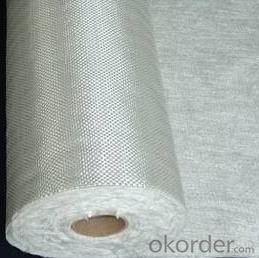
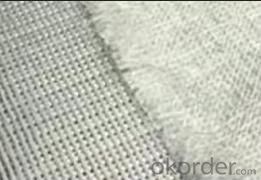
Technical Specification
Code | Density(g/m2) | Chopping layer density g/m2 | Width mm |
EMK225 | 225 | 225 | 150~2600 |
EMK250 | 250 | 250 | 150~2600 |
EMK300 | 300 | 300 | 150~2600 |
EMK450 | 450 | 450 | 150~2600 |
EMK600 | 600 | 600 | 150~2600 |
FAQ
1. Why Choose us?
CNBM is a stated own company, provide the guarantee for the best quality, best service and safety business.
2. How will we guarantee the quality?
a, ISO 9001-2008 quality control system;
b, Strict and regular quality control in production;
c, Inspeciation when loading into container before shippment;
d, Sample stock for one year for quality tracing and record.
3. What is your MOQ?
Our MOQ is one pallet.
4. Can you provide sample?
Yes, samples are in stock. we can offer free sample for you.
5. Payment terms?
We can accept L/C, T/T etc.
- Q: Is fiberglass mat tissue easy to install?
- Yes, fiberglass mat tissue is relatively easy to install. It is lightweight and flexible, making it convenient to handle and work with. Additionally, it can be easily cut to the desired size and shape, allowing for precise installation in various applications.
- Q: How long does fiberglass mat tissue last?
- The lifespan of fiberglass mat tissue can vary depending on various factors such as its quality, usage, and exposure to external conditions. Generally, fiberglass mat tissue is designed to be highly durable and long-lasting. When properly installed and maintained, it can typically last for several decades. However, it is important to note that fiberglass mat tissue can deteriorate over time due to environmental factors such as UV exposure, moisture, and temperature fluctuations. Continuous exposure to harsh weather conditions, extreme temperatures, or chemicals can accelerate the degradation process. To maximize the lifespan of fiberglass mat tissue, it is crucial to follow the manufacturer's guidelines for installation, maintenance, and periodic inspections. Regular inspections can help identify any signs of wear, damage, or degradation early on, allowing for timely repairs or replacements. It is recommended to consult with a professional or the manufacturer for specific information regarding the expected lifespan of a particular fiberglass mat tissue, as it can vary depending on the specific product and its intended application.
- Q: Can fiberglass mat tissue be used for insulating concrete forms (ICFs)?
- Yes, fiberglass mat tissue can be used for insulating concrete forms (ICFs). It is commonly used as a reinforcement material in ICF construction due to its excellent insulation properties and ability to improve the overall strength and durability of the concrete structure.
- Q: Is fiberglass mat tissue suitable for high-temperature applications?
- High-temperature applications are not suitable for fiberglass mat tissue. This type of tissue is usually composed of thin glass fibers interwoven to form a non-woven fabric. Although fiberglass is renowned for its robustness and endurance, it possesses a low melting point, rendering it unsuitable for withstanding high temperatures. Exposing fiberglass mat tissue to elevated temperatures may result in its melting or deterioration, leading to weakened structure and possible malfunction. Consequently, it is crucial to opt for alternative materials explicitly designed for high-temperature applications, such as ceramic or silicone-based products.
- Q: What is the typical thickness of fiberglass mat tissue?
- The typical thickness of fiberglass mat tissue can vary depending on the specific application and intended use. However, it is commonly available in thicknesses ranging from 0.5mm to 3mm. The choice of thickness is determined by factors such as the desired strength, flexibility, and absorption properties required for the particular project or product being manufactured. Thicker fiberglass mat tissue is generally used for applications that require higher levels of strength and durability, while thinner tissue is suitable for more lightweight and flexible applications.
- Q: How does the roll weight of fiberglass mat tissue affect its transportation?
- The roll weight of fiberglass mat tissue can have a significant impact on its transportation process. The weight of the roll determines the ease of handling and the logistics required for transportation. Firstly, a heavier roll weight can make it more challenging to move and handle the fiberglass mat tissue. If the roll is too heavy, it may require specialized equipment or machinery for loading and unloading, such as forklifts or cranes. This can add complexity and cost to the transportation process. Moreover, the weight of the roll also affects the packaging and storage requirements during transportation. Heavier rolls may require sturdier packaging materials and additional precautions to ensure their stability and prevent any damage during transit. This can include using pallets, strapping, or other securing methods to prevent the roll from shifting or falling during transportation. The weight of the roll also impacts the overall cost of transportation. Heavier rolls can increase shipping costs, as carriers often charge based on weight. Additionally, the weight of the roll can affect the number of rolls that can be transported in a single shipment, which can impact the efficiency and cost-effectiveness of the transportation process. In summary, the roll weight of fiberglass mat tissue plays a crucial role in its transportation. It affects the ease of handling, packaging requirements, and overall cost of transportation. Therefore, it is essential to consider the roll weight when planning and organizing the logistics for transporting fiberglass mat tissue.
- Q: What are the properties of fiberglass mat tissue?
- Fiberglass mat tissue, also known as fiberglass mat or fiberglass matting, is a type of non-woven material made from glass fibers. It possesses several properties that make it suitable for various applications. 1. Strength and durability: Fiberglass mat tissue is known for its high tensile strength, which means it can withstand significant amounts of stress without breaking. This property makes it ideal for reinforcing and strengthening different materials and structures. 2. Lightweight: Despite its strength, fiberglass mat tissue is relatively lightweight, making it easy to handle and transport. This property is particularly advantageous in industries where weight reduction is important, such as aerospace and automotive. 3. Flexibility: Fiberglass mat tissue is flexible, which allows it to conform to curved surfaces and complex shapes. This property makes it versatile and suitable for applications where the material needs to be molded or formed into specific designs. 4. Chemical resistance: Fiberglass mat tissue has excellent resistance to various chemicals, including acids, alkalis, and most solvents. This property makes it suitable for applications in corrosive environments, such as chemical processing plants or storage tanks. 5. Thermal insulation: Fiberglass mat tissue has good thermal insulation properties, meaning it can help to reduce heat transfer. This property makes it useful in applications where heat insulation is required, such as in the construction of walls, roofs, or insulation boards. 6. Fire resistance: Fiberglass mat tissue is inherently fire-resistant and does not contribute to the spread of flames. This property makes it widely used in applications where fire safety is essential, such as in the production of fire-resistant doors, panels, or insulation materials. 7. Sound insulation: Fiberglass mat tissue also offers good sound insulation properties, reducing noise transmission through walls or other structures. This property makes it suitable for use in soundproofing applications, such as in recording studios or automotive interior panels. Overall, the properties of fiberglass mat tissue make it a versatile material with a wide range of applications in various industries, including construction, automotive, aerospace, and marine. Its strength, flexibility, lightweight, chemical resistance, thermal and sound insulation properties, as well as its fire resistance, contribute to its popularity and usefulness in many different applications.
- Q: How does fiberglass mat tissue perform in terms of thermal resistance?
- Fiberglass mat tissue displays outstanding performance in terms of thermal resistance. Thanks to the inherent characteristics of fiberglass, such as its low thermal conductivity and high melting point, the mat tissue functions effectively as a shield against the transfer of heat. It efficiently hinders the conduction of heat, restricting the flow of thermal energy through the material. Consequently, fiberglass mat tissue proves to be a superb option for insulation applications that require significant thermal resistance, such as in the construction of buildings, industrial machinery, and automotive parts. Furthermore, fiberglass mat tissue is renowned for its fire-resistant properties, which further enhances its capability to endure high temperatures and provide exceptional thermal insulation.
- Q: How does fiberglass mat tissue perform in terms of moisture vapor transmission?
- Fiberglass mat tissue performs poorly in terms of moisture vapor transmission. It has a very low permeability to moisture vapor, making it an effective barrier against moisture penetration. This characteristic makes fiberglass mat tissue ideal for applications where moisture control and prevention are crucial, such as in roofing and insulation materials. The low moisture vapor transmission rate of fiberglass mat tissue helps to maintain the integrity of the structure by preventing moisture buildup, condensation, and potential damage caused by mold or rot.
- Q: Is fiberglass mat tissue suitable for automotive applications?
- Yes, fiberglass mat tissue is suitable for automotive applications. It is commonly used for reinforcing and strengthening automotive parts such as body panels, hoods, and bumpers. The fiberglass mat tissue provides excellent strength, impact resistance, and durability, making it a reliable choice for automotive use.
Send your message to us
Fiberglass Mat Tissue E Glass Fiber Stitched Mat for FRP Industry
- Loading Port:
- Shanghai
- Payment Terms:
- TT or LC
- Min Order Qty:
- 10000 kg
- Supply Capability:
- 200000 kg/month
OKorder Service Pledge
OKorder Financial Service
Similar products
Hot products
Hot Searches
Related keywords
